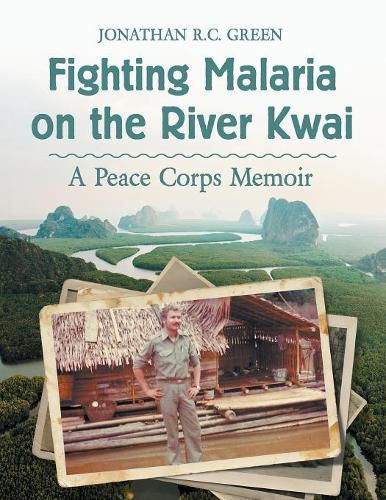Readings Newsletter
Become a Readings Member to make your shopping experience even easier.
Sign in or sign up for free!
You’re not far away from qualifying for FREE standard shipping within Australia
You’ve qualified for FREE standard shipping within Australia
The cart is loading…






This title is printed to order. This book may have been self-published. If so, we cannot guarantee the quality of the content. In the main most books will have gone through the editing process however some may not. We therefore suggest that you be aware of this before ordering this book. If in doubt check either the author or publisher’s details as we are unable to accept any returns unless they are faulty. Please contact us if you have any questions.
During World War II, 12,000 Allied prisoners of war died while constructing a bridge over the river Kwai in western Thailand, and then a railway through the thick jungles of the Kwai Valley all the way to Burma.
Decades later, during the Vietnam War, Jonathan R.C. Green enlisted as a medic in the U.S. Army, expecting to take care of wounded Americans and Asians, but was kept in a Stateside assignment instead, much to his frustration. So, shortly before his enlistment expired, he applied for the Peace Corps and asked to serve in Southeast Asia.
Six weeks after leaving the Army, he arrived in Thailand as a Peace Corps Volunteer. His job assignment was to fight malaria by controlling the mosquito populations in remote jungle villages in the valley of the infamous River Kwai.
Besides the hazards posed by snakes, scorpions and centipedes in the jungle, he ran the risk of contracting malaria, dengue fever and other mosquito-borne diseases, while suffering severe bouts of dysentery. He often had to live on a monotonous diet of rice, bamboo shoots and hot sauce three times a day, with the only reasonably safe drinking water coming from rain barrels teeming with mosquito larvae.
While becoming accustomed to a rugged lifestyle in the jungle, he had to quickly learn a complex language and exotic culture. An inadvertent misstep in manners could have damaged his credibility, and hence the outcome of his undertaking, as badly as catching the disease he was supposed to be fighting.
$9.00 standard shipping within Australia
FREE standard shipping within Australia for orders over $100.00
Express & International shipping calculated at checkout
This title is printed to order. This book may have been self-published. If so, we cannot guarantee the quality of the content. In the main most books will have gone through the editing process however some may not. We therefore suggest that you be aware of this before ordering this book. If in doubt check either the author or publisher’s details as we are unable to accept any returns unless they are faulty. Please contact us if you have any questions.
During World War II, 12,000 Allied prisoners of war died while constructing a bridge over the river Kwai in western Thailand, and then a railway through the thick jungles of the Kwai Valley all the way to Burma.
Decades later, during the Vietnam War, Jonathan R.C. Green enlisted as a medic in the U.S. Army, expecting to take care of wounded Americans and Asians, but was kept in a Stateside assignment instead, much to his frustration. So, shortly before his enlistment expired, he applied for the Peace Corps and asked to serve in Southeast Asia.
Six weeks after leaving the Army, he arrived in Thailand as a Peace Corps Volunteer. His job assignment was to fight malaria by controlling the mosquito populations in remote jungle villages in the valley of the infamous River Kwai.
Besides the hazards posed by snakes, scorpions and centipedes in the jungle, he ran the risk of contracting malaria, dengue fever and other mosquito-borne diseases, while suffering severe bouts of dysentery. He often had to live on a monotonous diet of rice, bamboo shoots and hot sauce three times a day, with the only reasonably safe drinking water coming from rain barrels teeming with mosquito larvae.
While becoming accustomed to a rugged lifestyle in the jungle, he had to quickly learn a complex language and exotic culture. An inadvertent misstep in manners could have damaged his credibility, and hence the outcome of his undertaking, as badly as catching the disease he was supposed to be fighting.